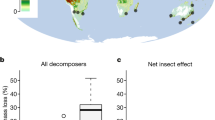Abstract
Insects may damage woody plants in a variety of different ways and, consequently, their potential to reduce the photosynthetic capacity or net primary production of forests is considerable:
-
1.
Foliage consumption deteriorates the physiological condition of the tree, decreases the photosynthetic biomass, and indirectly affects the wood increment and the formation of reproductive organs.
-
2.
Sap consumption also deteriorates the physiological condition of the tree and reduces foliage and wood production, but not to the extent as does the consumption of photosynthetic tissues by phytophages.
-
3.
Consumption of woody tissues decreases wood production; it also can disrupt sap flow and, therefore, deteriorates the overall condition of the tree. However, wood consumption generally affects weakened plants or their parts, and damage to the entire forest stand caused by xylophages is not as great as with foliage consumers. In fact, dead wood consumption may be beneficial to plants, since it thins the nonproductive, but light-intercepting parts of trees.
-
4.
Insect damage to reproductive organs (at all stages of their development) may decrease fruit production and reduce the reproductive potential, but normally it does not influence the foliage and wood increment of growing trees.
Access this chapter
Tax calculation will be finalised at checkout
Purchases are for personal use only
Preview
Unable to display preview. Download preview PDF.
Similar content being viewed by others
References
Golosova, M. A.: Biology and economic values of loopers Biston and Phigalia in oak woods of steppe zones. Doctoral Dissertation 22 p. Moscow Forest Engineering Institute (1963).
Ierusalimov, E. H.: Change in accretion in mixed oak forests following defoliation by leaf-eating insects. Izv. Vyssh. Ucheb. Zaved., Lesn. Kh. 6, 52–55 (1965).
Ierusalimov, E. H.: Influence of canopy defoliation by leaf-eating insects on certain elements of the forest biocenosis. Doctoral Dissertation, 18 p. Moscow Forest Engineering Institute (1967).
Ilinskii, A. I. (Ed.): Control of leaf-eating pests in forests and prediction of their outbreaks, State Pulp and Paper Pub. House, 138 p (1952).
Ilinskii, A. I.: The Gipsy moth and its control measures. State Pulp and Paper Pub. House (1959).
Ilinskii, A. I., and I. A. Kobozev: Gipsy moth invasions in the Tellerman State Forestry Farm and their influence on accretion of oak. Nauchn. Zap. Voronezh Institute of Forest Economy 5, 11–28 (1939).
Ilinskii, A. I., and I. V. Tropin (Eds.): Survey and recording of leafeating pests and prediction of their outbreaks. Lesn. Prom-St’ (Forest Industry), 525 p. (1964).
Mozolevskaya, E. G., and I. Tudor: Effect of Tortrix viridana L. on the state and accretion of oak forests, pp. 6–14. In: Problems in protection of forests, 15. Moscow: Forest Engineering Institute 1967.
Rafes, P. M.: Insect pest outbreaks as a special case in the material and energy turnover in a forest biogeocenosis, pp. 3–57. In: Forest Protection from Pests. Moscow: Science Pub. House 1964.
Rafes, P. M.: The food relations of forest insects. Trans. 17 th and 18 th Memorial Sessions of Kholod-kovskii. Moscow: Science Pub. House 1967.
Rafes, P. M.: The role and significance of phytophagous insects in forests, 234 p. Moscow: Science Pub. House 1968.
Rudnev, D. F.: Methods of surveying and recording infestations of Panolis flammea Schiff. In: Forests, Proc. Inst. Zool. and Biol. Ukrainian Acad. Sci., Kiev (1935).
Smirnov, V. V.: Seasonal growth of main tree species. Moscow: Science Pub. House 1964.
Sukachev, V. N., and N. V. Dylis: Fundamentals of forest biogeocenology, 574 p. Moscow Science Pub. House 1964. (English translation published by Oliver and Boyd, 1968).
Turchinskaya, I. A.: Effect of defoliation by the Gipsy moth and other leaf-eating pests on the growth of oak. Zool. Zh. 42 (1963).
Vorontsov, A. I.: The biological bases of forest protection, 348 p. Moscow: Vyssh. Shkola 1963.
Vorontsov, A. I.: Criteria for chemical control of pests in deciduous plantings, pp. 19–29. In: Problems in protection of forests, 15. Moscow: Forest Engineering Institute (1967).
Vorontsov, A. I., M. A. Golosova, and E. G. Mozolevskaya: Criteria for the basis of chemical control of leaf-eating insects, pp. 3–10. In: Problems of forest protection. Moscow: Central Sci. Res. Institute 1966.
Vorontsov, A. I., E. N. Ierusalimov, and E. G. Mozolevskaya: The role of leaf-eating insects in forest biogeocenoses. Zh. Ob. Biol. 28, 172–187 (1967).
Editor information
Rights and permissions
Copyright information
© 1973 Springer-Verlag Berlin · Heidelberg
About this chapter
Cite this chapter
Rafes, P.M. (1973). Estimation of the Effects of Phytophagous Insects on Forest Production. In: Reichle, D.E. (eds) Analysis of Temperate Forest Ecosystems. Ecological Studies, vol 1. Springer, Berlin, Heidelberg. https://doi.org/10.1007/978-3-642-85587-0_9
Download citation
DOI: https://doi.org/10.1007/978-3-642-85587-0_9
Publisher Name: Springer, Berlin, Heidelberg
Print ISBN: 978-3-642-85589-4
Online ISBN: 978-3-642-85587-0
eBook Packages: Springer Book Archive




